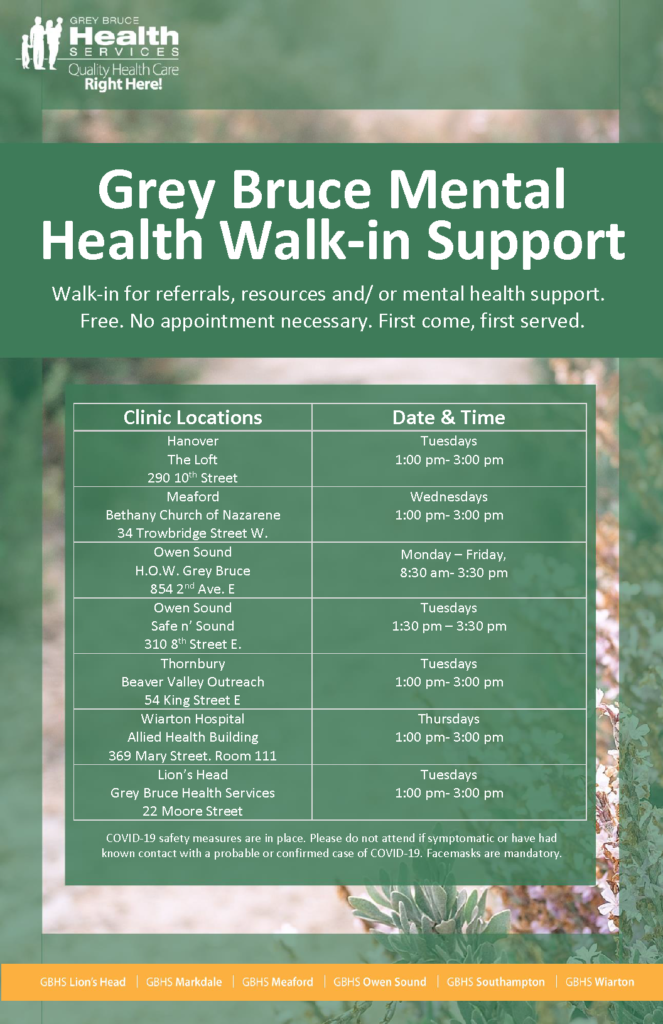
As of April 25, 2022, these will come into effect:
Walk-In Support Services:
Access to Clinical Social Workers and Registered Psychotherapists will be available to provide single session psychotherapy at various sites. Please see attached flyer for service times and locations. The Walk-In Support is run on a first-come-first-served basis. No referral required.
Group Based Services:
The expanded group programming listed below will be offered to participants upon the completion of the Psychoeducation Introductory Group. This initial 3-week group will prepare participants for further therapeutic programming. We are accepting self-referrals and community provider referrals for all group programming. Referrals can be sent via fax to 519-376-2445. Patients can self-refer to GBHS’ Mental Health Program by calling 519-371-8850.
- Cognitive Behavioral Therapy (CBT)
This 8-week group is a psycho-social intervention that focuses on thoughts, feelings, and behaviors geared towards individuals with moderate to severe symptoms of depression and anxiety. Participants should have some effective coping skills in place to manage high levels of distress.
- Schema Core Beliefs
This 8-week group is a newer type of therapy that combines elements from Cognitive Behavioral Therapy (CBT), psychoanalysis, attachment theory, and emotion-focused therapy, among others. It is an integrative approach aimed to treat the diagnosis of personality disorders, and other mental health concerns, that do not always respond to other treatment options.
- Cognitive Behavior Therapy-Insomnia (CBT-I)
This 6-week group focuses on the problematic thoughts, feelings, and behaviors that negatively affect our ability to get to sleep quickly and sleep soundly. This group will support you through identifying the contributing symptoms of insomnia using an evidence-based and therapeutic approach.
- Cognitive Behavior Therapy-Psychosis (CBT-P)
This 10-week group is based on the cognitive model to help individuals make sense of their psychotic experiences by connecting life events or beliefs to psychotic symptoms. This group will help individuals reduce symptoms and distress associated with psychosis and improve coping, problem solving, interpersonal skills, general functioning and quality of life.
- Distress Tolerance
This 7-week group is a prerequisite to attend our 26-week Dialectical Behavior Therapy (DBT) group. This group is geared towards individuals experiencing high levels of distress and impulsivity and who fell unable to cope effectively. Participants are taught the practices of mindfulness and distress tolerance skills, which are derived from Marsha Linehan’s DBT curriculum. Participants will practice newly learned skills between sessions and share their home practice with the group.
- Dialectical Behavior Therapy (DBT)
This 26-week group is offered through a skills based group meeting for 2 hours once per week for the duration of the 26 weeks. Group content focuses in on the areas of mindfulness, distress tolerance, emotion regulation, and interpersonal effectiveness skills. This group is beneficial for individuals who have difficulties with intense or extreme emotions, leading to impulsivity and/or unhealthy coping.
- Condensed Dialectical Behavior Therapy
This 16-week group is available to individuals who have completed Distress Tolerance group and have a good level of affect tolerance. Condensed DBT focuses on the mindfulness, emotion regulation, and interpersonal effectiveness modules of the full 26-week DBT program. To participate in this group, participants must complete a self-referral and assessment with the group facilitator
- Radically Open DBT
This 30-week group is a new treatment developed to address the behavior of over-control, as often seen in people with diagnosis of chronic depression, treatment resistant anxiety disorders, anorexia nervosa, and autism spectrum disorders. People who experience over-control as problematic may present with maladaptive perfectionism, cognitive rigidity, insistence on sameness, strong personal needs for structure and symmetry, greater self-criticism, rigid internalized expectations, excessive control of spontaneous emotion, inordinate fears of making mistakes, aloof interpersonal functioning, and social isolation. Self-referral and assessment regarding over-controlled behaviors and group readiness is required.
- Mentalization-based Therapy (MBT)
This 8-week group will take participants through learning mentalization (the ability to think about thinking, understanding each other and ourselves), emotions, attachment, interpersonal interactions and the connection to mental health. This group is aimed at further supporting individuals who have completed DBT, or for individuals whom DBT was not a good fit.
- Introduction to Trauma
Psychoeducation Trauma Group This 8-week group offers skills and education that focuses on trauma and the impact of trauma on one’s life with emphasis on fostering resiliency and recovery.
- Trauma Processing
Trauma Processing Group An 8-week group that allows individuals who have experienced trauma the opportunity to reprocess and heal from their traumatic experiences. This group may use therapies like EMDR or Cognitive Processing Therapy to assist with the processing of an individual’s trauma(s).
- Resiliency and Recovery
Resiliency and Recovery Group The goal of this 5-week course is to build strength in resiliency and recovery, where participants will be learning how to create their wellness toolbox and a personal care plan that supports a life worth living. Participants will be introduced to the recovery model looking at stages of change and support that encompass the idea that all individuals can live a self-directed life striving for health and wellness with full potential.
Note: Sexual Assault and Partner Abuse Care Centre (SAPACC) individual counselling services will continue and are available to those who have experienced sexual assault or domestic violence within the last year at time of referral.

